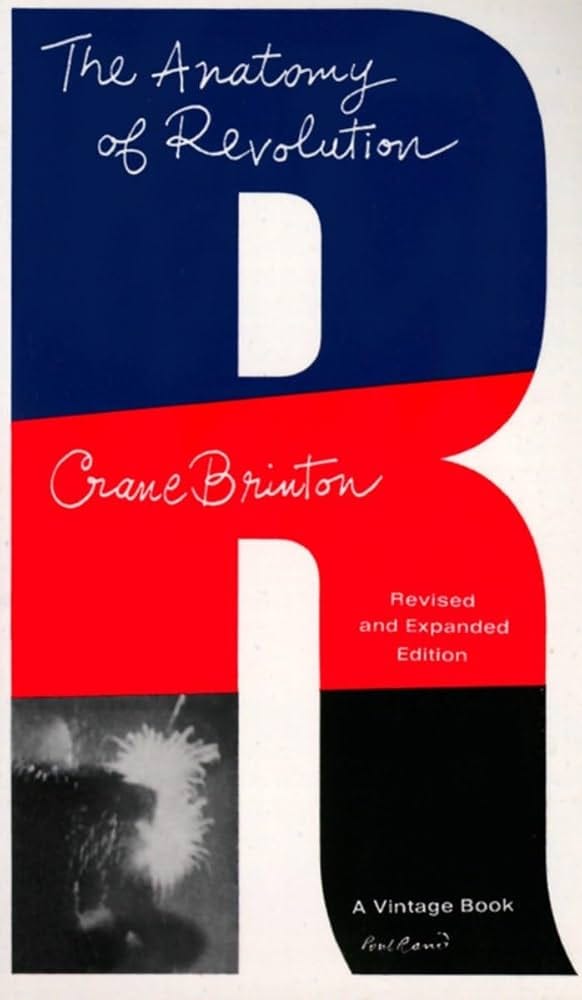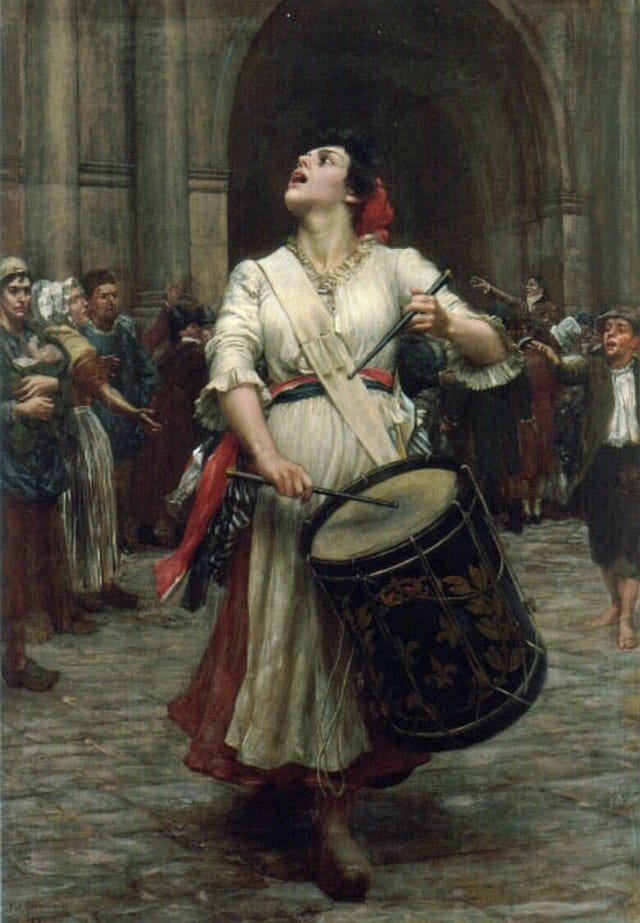Do you know the five symptoms of revolution?
Apropos of absolutely nothing I am sure, I have been thinking a lot about a book called The Anatomy of Revolution by Crane Brinton.

Inside this volume is an excellent little autopsy of the most prominent revolutions from the last few hundred years. Brinton compares the American Revolution, I'm sure you know a thing or two about that one, the French Revolution, the English Revolution (that's the one with Oliver Cromwell - not super well known in the states) and finally the Russian Revolution of 1917, which Americans might know as the Communist Revolution or the Bolshevik Revolution.
The purpose of this book is to see what lines up. What kind of similarities can be teased out between these huge, important historical events? In the end, Brinton summarizes 5 symptoms of revolution.
Before giving this list, Brinton is quick to point out, “We must be very tentative about the prodromal symptoms of revolution." He writes that this is a highly complicated subject and that because there are so many different variables at play it is perhaps impossible to diagnose any incipient revolutions that might be happening in the present day with a high degree of certainty. Wink! "But," he says, "some uniformities do emerge from a study of the old regimes in England, America, France, and Russia.”
So, Brinton's first symptom of revolution is “an intolerable gap between what people want and what they get.” As Brinton notes, revolutions frequently show up following periods where the standard of living was going up - and then stops. Much as we have seen in the past 40 plus years since Ronald Reagan and the double barreled acceptance of neoliberalism by both major political parties - productivity has gone way up, but wages are frozen in place. In comparing the four major revolutions, Brinton writes "these were all societies on the whole on the upgrade economically before the revolution came, and the revolutionary movements seem to originate in the discontents of not unprosperous people who feel restraint, cramp, annoyance, rather than downright crushing oppression. … These revolutions are not worms turning, not children of despair. These revolutions are born of hope, and their philosophies are formally optimistic." This is because people grew up thinking, much like in our society, that they would someday end up better off. When that doesn't happen it creates a widespread feeling of discontent. Highly relatable.
The second symptom, prerevolutionary societies are marked by bitter class antagonisms. I don't think I need to spell this one out for you. Modern American society has done its share of wealth and celebrity worship. But the resentment is there. There is growing awareness amongst the mass population that the wealth at the top of the capitalist pyramid scheme comes from us, the working class. It is our hard work that makes the super rich, super rich. Class is short for classification. If we classify Americans by wealth or income the difference between the rich owning class and the working class is at an all-time high. A classic hallmark of a prerevolutionary society is when these differences become obvious - and people start getting really pissed off about it.
The third symptom of revolution is what Brinton calls the "transfer of allegiance of the intellectuals." This is where the educated turn against supporting the status quo and instead support the oppressed. Brinton doesn't linger on this point other than to say it is present in all four cases. What happens is that reality can no longer be denied - and so smart people stop trying to deny it. Check out TikTok or Substack any day of the week to see this playing out in real time.
The fourth symptom is that governmental machinery becomes clearly inefficient, partly from neglect, partly from government's inability to allow old institutions to keep up with the times, and partly because new conditions place "an intolerable strain on governmental machinery adapted to simpler, more primitive conditions." It so happens that America's governmental machinery hasn't been updated much in the last 237 years. Just sayin...
Finally, the fifth symptom is that "the old ruling class – or rather, many individuals of the old ruling class – come to distrust themselves, or lose faith in the traditions and habits of their class, grow intellectual, humanitarian, or go over to the attacking groups." You can recognize what Brinton calls the "disintegration of the ruling class" when elites start getting scared and start supporting the cause of the oppressed classes, or what he pithily calls the upperdogs deciding to side with the underdogs. Writes Brinton, "It is not altogether cynical to hazard the guess that this is sometimes an indication that there is about to be a reversal in the position of the dogs." This is one that I don't believe I have witnessed happening a whole lot... yet. Right now we are in the waning glory days of a modern Gilded Age. It won't last forever. Keep this in mind when the billionaire class suddenly start sounding a whole lot more sympathetic toward the working class. They may even propose some desperate reforms to keep the existing system a while longer. Don't fall for it, because it is a sure sign that the end is nigh.
So there you have the five symptoms of a prerevolutionary society according to Crane Brinton. Depends on who you're asking but it sure looks to me like modern Western society, and the United States in particular sure does check most of those boxes. Don't you think? Let me know in the comments.
Please give a like, comment, and restack so that others can see my posts here on Substack.
Lets’s make them pay.


















Share this post